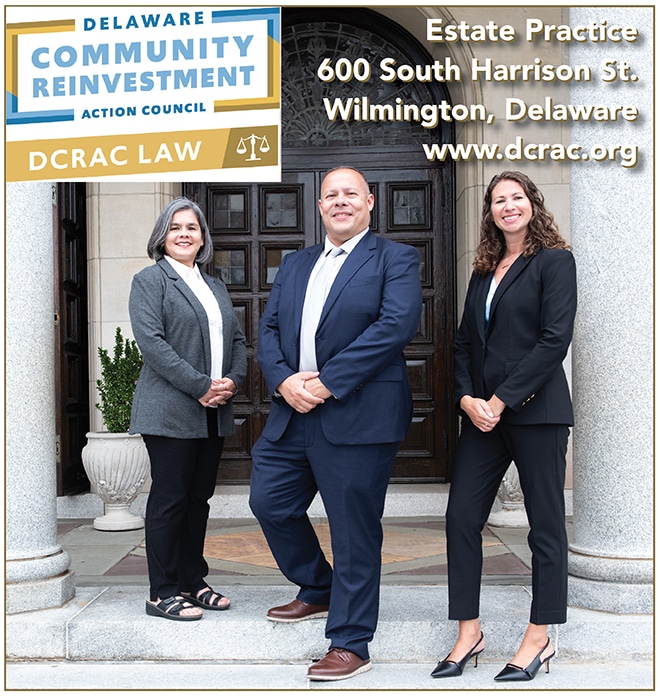Estate Planning Is For You—Yes, You!

By Jaclyn Quinn, Esq.
Delaware Community Reinvestment Action Council, Inc.
At the Delaware Community Reinvestment Action Council (DCRAC), we make estate planning accessible to as many people as possible. Our team is mindful that the fear of unaffordability keeps people from seeking legal help—an ongoing issue with legal and financial services that DCRAC works to counter more broadly—so we work to keep fees reasonable and transparent to help with the process.
Estate planning can sound overwhelming, expensive, or even unnecessary for many of the families DCRAC Law most frequently services—but none of those needs to be the case. We talk about it in plain English (or Spanish!), and we take the time to make sure every client is comfortable with what we’re doing and understands its importance. Also, if we’re not the right team to support your household’s needs, we tend to know who is.
DCRAC Law’s specialized estate practice recently expanded to a team of three! In addition to me, we have had paralegal Mayela Rosales on board since 2023, and now we are pleased to welcome Matthew Carucci, Esq. to expand our ability to serve clients.
Matt and I sat down for a Q&A on his philosophy about planning, and why everyone needs to prepare an estate:
Q: How would you describe estate planning to someone who is unfamiliar?
Matt: Estate planning is making sure your needs and the needs of your loved ones are met. It can be simple or complex depending on your unique situation. At a minimum, everyone needs to establish a Last Will and Testament, Durable Power of Attorney (POA), and Advance Health Care Directive (AHCD). Some people choose or need to have a more complicated plan with trusts, while others are all set with these three standard documents. Nobody’s situation is “too simple”—everyone should have them in place to ensure their final wishes are respected.
Q: Why did you decide to be an estate planning lawyer?
Matt: I wanted to focus in an area of law where I was helping people. I find that, with estate planning, clients walk away happy and feeling accomplished after our work is finished. It’s highly rewarding to know they have peace of mind after completing planning together!
Q: If someone is thinking about completing estate planning for the first time, what should they know?
Matt: Just start! We’re happy to help, but so are plenty of other qualified attorneys. Start early, and you can always amend and update your documents as the years go by. It’s never a bad time to make sure you have a plan in place, and that it’s legally sound.
Life can change in an instant. If you look for excuses to delay planning, you will find them. Instead, commit to getting a plan in place, and revisit it occasionally to make sure it continues to be reflective of your wishes. You can never start too early.
Q: What are some common mistakes you often see in estate planning?
Matt: People make assumptions about where their assets will go and think they don’t need a formal will to pass them on, or to take further action to establish their vision. Unfortunately, these mistaken beliefs can lead to big problems if they aren’t addressed in time.
Absent a proper will, the state’s Intestacy Statute dictates where your assets will go. That can make life after a loved one’s passing very difficult, especially if real estate is involved.
Another common mistake is not wanting to hurt feelings—like putting all the deceased’s children in charge together so nobody’s feelings get hurt. But, with no clear “team captain,” that arrangement instead can lead to more disagreements and fighting among surviving children.
Matt, Mayela, and I are looking forward to continuing to provide education and legal representation to anyone seeking a comprehensive plan for themselves and their loved ones. Without that, you and those you care for, may be left with limited options—and the need for more expensive, time-consuming legal interventions.
For example, if someone becomes incapacitated and can no longer conduct their own financial transactions, a POA can appoint their agent to step in and handle business for them. Without a POA in place, if the patient loses capacity, the only way for someone to obtain legal authority would be to petition the court for guardianship over the person. This is a potential issue that can be solved by signing a document now—and we’re here to help.
If you need legal advice, Jaclyn Quinn is licensed to practice law in Delaware and she and her colleagues at the Delaware Community Reinvestment Action Council are available to assist. For more information, or to schedule a consultation, please call paralegal Mayela Rosales at 302-230-2970 or email [email protected]. For more information, visit www.dcrac.org.
Bio
Jaclyn Quinn, Esq. joined the Delaware Community Reinvestment Action Council (DCRAC) in 2011, first as a volunteer, then as staff. In 2014 Jaclyn opened and grew her private practice until 2019, when DCRAC Law opened to the community. DCRAC Law is a nonprofit law firm providing tax, title, and other legal services to those unable to pay market rates.
Jaclyn graduated with a B.A. in Political Science from The College of New Jersey before moving to Delaware to pursue her J.D. at Widener University- Delaware Law School. She was admitted to the Delaware Bar in 2012, and is also barred in U.S. Tax Court and U.S. Immigration Court. She has volunteered with the Office of the Child Advocate, DVLS, and assists as pro bono counsel in a variety of cases.
Jaclyn Quinn, Esq. Delaware Community Reinvestment Action Council (DCRAC)
302-298-3251 [email protected] www.dcrac.org
@dcracdelcra on instagram & @DCRACDelCRA on facebook
600 South Harrison Street, Wilmington, Delaware
One East Laurel Street, Georgetown, Delaware


